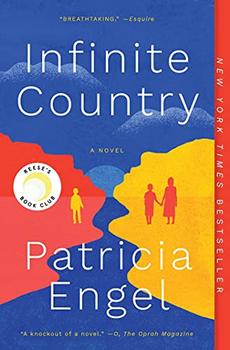Reading Guide Questions

Please be aware that this discussion guide will contain spoilers!
- Infinite Country begins with Talia's restraint of a prison school nun, her time at the correctional facility a punishment for committing an even more viscerally violent attack. Think about Talia's decision to throw hot oil on the man who killed the cat and how this choice surfaces at various points. Reflect also on the sentence, "Talia considered how people who do horrible things can be victims, and how victims can be people who do horrible things" (page 8). What role does moral ambivalence play in the novel?
- For Mauro and Elena's family of five, the concept of "home" is a fluid one, distinct to each character and dependent on time and place. Choose a character and chart their relationship to Colombia and to the United States. Does it change, and if so, what affects this shift?
- Although the settings of Infinite Country are primarily urban, Engel writes of lush Colombian landscapes brimming with beasts and allegories, stories in which Mauro finds a particular sense of pride. How do descriptions of North American cities compare, and what emotions can be gleaned from both kinds of imagery?
- At the end of chapter five, Elena watches airplanes crash into the World Trade Center on September 11 and wonders "if she was hallucinating" (page 37). In what ways might feelings of uncanniness and displacement be heightened for Elena, Mauro, and other members of diaspora?
- Talia is named after Talia Shire, the actress who plays Adrian Pennino-Balboa of the Rocky franchise. Elena thinks Adrian is "much tougher than the boxer. Only women knew the strength it took to love men through their evolution to who they thought they were supposed to be" (page 44). How does Mauro and Elena's relationship demonstrate this dynamic? At the beginning of the novel, who does Mauro think he is supposed to be, and who does he end up becoming?
- As she hitchhikes back to her father in Bogotá, Talia meets three men who agree to help her home. What insights do they share with her about her impending journey north? What does each encounter say about Talia's character and the way she moves about the world?
- In her nightmares, Elena finds herself in the midst of the Nevado del Ruiz eruption. Although she usually dreams that she is either trying to pull Omayra Sánchez to safety or she becomes Omayra herself, Elena dreams that she is "a bird or a cloud watching from above" after Mauro is deported (page 85). What does this passage disclose about Elena's psyche during this difficult period in her life?
- Between Elena, Perla, Tracy, and the women with whom Elena forms a community in New Jersey, mothers are omnipresent in Infinite Country. How do these maternal energies manifest within Engel's network of characters?
- Karina reveals herself to be "the author of these pages" in chapter nineteen (page 127). What impact did this revelation have on your reading of the novel? How did Karina and Nando's palpable anger affect you?
- Sometimes, after Mauro would leave his and Elena's bed at Perla's to smoke a cigarette on the roof, Elena would follow him and watch. "When she did say his name," Engel writes, "he met her with an indecipherable expression" (page 166). Imagine what emotions a young Mauro might have been experiencing looking out at the "veined mountain lights" (page 166). Why is his connection to his homeland so fraught?
- Once Talia lands in the United States, she is happy but overwhelmed by her new life in New Jersey, preoccupied by the sense that she is "waiting for something ... Another departure? Another arrival?" (page 179). What function does Talia's plotline have in the context of so many threads of experience, even if she is "no longer sure where her journey began or where it should end" (page 179)?
- At Infinite Country's end, the entire family has been reunited, though the threat of separation still looms in an all too possible future. If Karina was to continue writing this "book of our lives" past the novel's conclusion, what are some everyday struggles and triumphs she might portray (page 190)?
Enhance Your Book Club
- As a group, pull up a map of the United States and Colombia and trace the routes that lead each character to New Jersey by the final pages of the book. Identify important moments in the novel and attach them to physical locations—you can split up into smaller groups by character or country. When everyone has finished, come back together to discuss how this exercise expands your understanding of how geography influences the emotional inflection points of Infinite Country.
- Before they leave for Texas, Mauro, Elena, and Karina visit Lake Guatavita, the birthplace of all human life for the Muisca people, in order to "conjure their deepest desire" (page 80). Come up with a list of minor characters in Infinite Country (for example, Tiberio, Aguja, Mister and Madame) and divide yourself into that many groups. Within these smaller clusters, invent a life for these characters beyond the book, and imagine what they might have wished for at Lake Guatavita. Try writing a short passage, or simply come back together into the bigger group to have a larger conversation.
- Brainstorm a list of other novels wherein immigration figures prominently and discuss how these selections differ from or are similar to Infinite Country. How do style and content affect your emotional reaction? What did you appreciate about Engel's approach? You can also include other art forms. Would it be difficult to adapt Infinite Country into another medium?
Unless otherwise stated, this discussion guide is reprinted with the permission of Avid Reader Press.
Any page references refer to a USA edition of the book, usually the trade paperback version, and may vary in other editions.

 Book Reviewed by:
Book Reviewed by:





